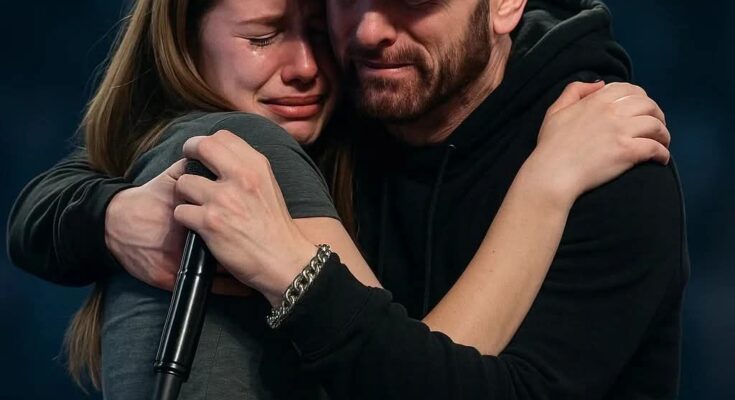The crowd at Detroit’s Ford Field fell into a hush as Eminem lowered his mic mid-verse, his eyes locking onto a weathered sign held high in the front row: “I got into Stanford. You said we’d rap.”
The arena held its breath as a young woman stepped up onto the stage — Lily Tran, once a foster child, now a full-scholarship student at Stanford University, one of the most prestigious institutions in America. At just 9 years old, Lily had met Eminem at a backstage meet-and-greet.
Back then, she told him her dream: to escape hardship through education and music. Eminem had crouched down, hugged her, and said: “When you get into college, if I’m still rapping, we’ll do a track together.”
Today, she kept her promise. And so did he. Together, they performed an emotional rendition of his classic “Lose Yourself.” Lily’s voice was shaky at first as she took on the verses he’d given her, but with each line, her confidence grew — as if every memory, every struggle, and every hope she’d carried had poured straight into the beat.
The stadium, usually roaring with energy, fell silent, wrapped in the raw power of the moment — and then erupted into cheers, tears, and applause. As the final note hit, Eminem leaned toward her and whispered: “You didn’t just keep your promise… you reminded me to keep mine.”
The audience rose to their feet in thunderous applause — not just for a performance, but for something far rarer: a moment where hip-hop became more than music — it became hope, resilience, and a promise fulfilled ![]()

The crowd at Detroit’s Ford Field fell into a hush as Eminem lowered his mic mid-verse, his eyes locking onto a weathered sign held high in the front row: “I got into Stanford. You said we’d rap.”
The arena held its breath as a young woman stepped up onto the stage — Lily Tran, once a foster child, now a full-scholarship student at Stanford University, one of the most prestigious institutions in America. At just 9 years old, Lily had met Eminem at a backstage meet-and-greet.
Back then, she told him her dream: to escape hardship through education and music. Eminem had crouched down, hugged her, and said: “When you get into college, if I’m still rapping, we’ll do a track together.”
Today, she kept her promise. And so did he. Together, they performed an emotional rendition of his classic “Lose Yourself.” Lily’s voice was shaky at first as she took on the verses he’d given her, but with each line, her confidence grew — as if every memory, every struggle, and every hope she’d carried had poured straight into the beat.
The stadium, usually roaring with energy, fell silent, wrapped in the raw power of the moment — and then erupted into cheers, tears, and applause. As the final note hit, Eminem leaned toward her and whispered: “You didn’t just keep your promise… you reminded me to keep mine.”
The audience rose to their feet in thunderous applause — not just for a performance, but for something far rarer: a moment where hip-hop became more than music — it became hope, resilience, and a promise fulfilled ![]()



